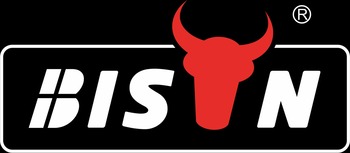BISON Pressure Washers Manufacturer
Bison factory specializes in the production of various jet wash machine. In the DIY market,
we develop new molds every year to help customers open the market.
Pressure Washer in commercial and industrial applications,
we focus on quality with professional solutions.
Check below info to get more info.
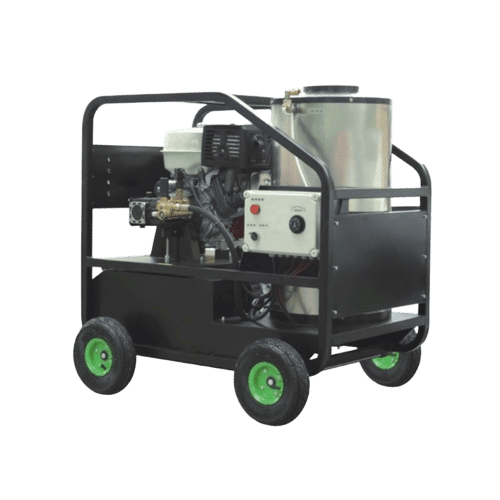
Hot Water Diesel High Pressure Washer
Bison diesel powered hot water pressure washers combine the best in dependability and performance. Options for industrial power washers include economical and commercial strength, as well skid-mounted or portable models. Our largest hot water pressure washers deliver 200°F water and dual-gun capabilities, and are super fuel-efficient, cutting your average fuel consumption by 21% or more.
Cold Water Gasoline Pressure Washer
Bison gasoline powered cold water pressure washers combine the best in dependability and performance. Options for industrial power washers include economical and commercial strength, as well skid-mounted or portable models.
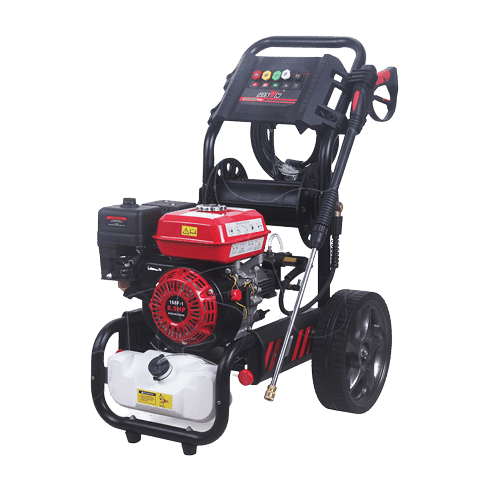
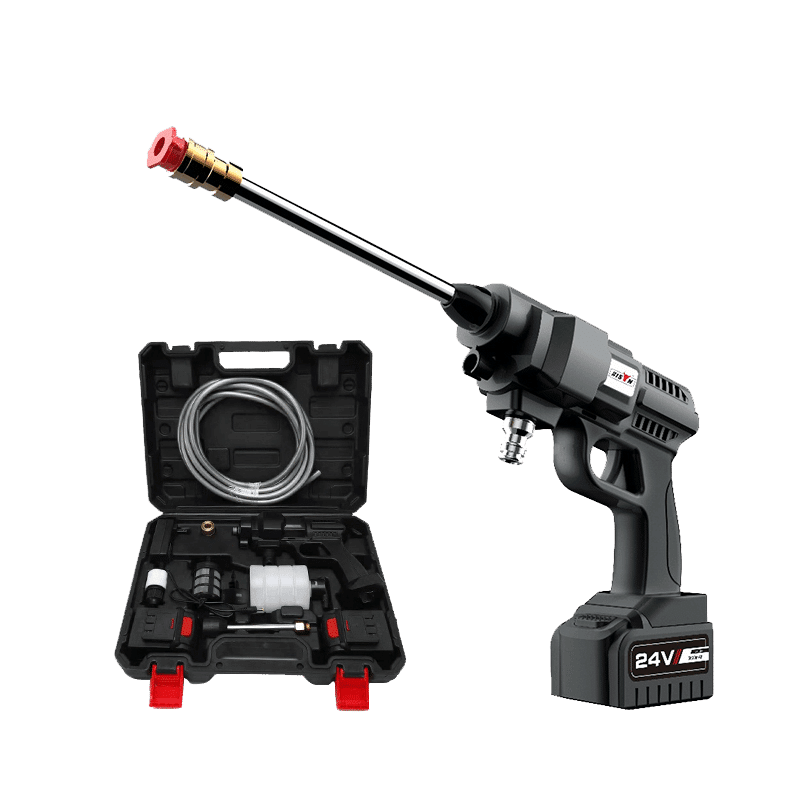
BISON Cordless High Pressure Washer
Bison cordless pressure washer start from 12V-48V, all machine are equipped with a long enough self-priming hose that can draw water from narrow sources such as a lake, well or bucket of water,perfect for portable outdoor use.
Everything about Bison Pressure Washers
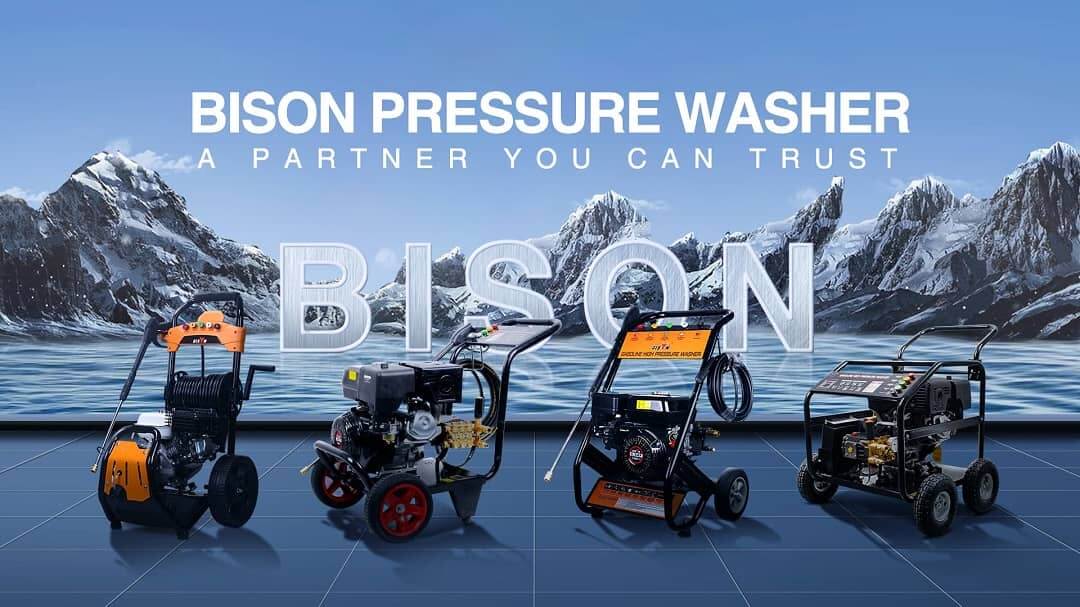
Pressure washers are extremely efficient when working outdoors. It can effectively remove paint, stains and mold on the surface of objects, and can also be used to clean decks, streets and other places. Faced with the huge product lineup on the market, how to choose the perfect pressure washer has become a difficult problem.
As a well-known high pressure washer manufacturer, BISON has a full range of high-pressure cleaning equipment, including electric, gas, hot and cold water types, as well as novel battery-driven products. Here’s a comprehensive guide to help you choose the perpect pressure washer.
How to Choose the right pressure washer?
When choosing a pressure cleaner, one of the primary considerations is the power source. The power source has a significant impact on maintenance, mobility, upfront costs, and running expenses of the machine. There are three standard power types available: Electric, Petrol, and Diesel.
Electric Pressure Washers:
Electric pressure washers are quiet, lightweight, and easy to start. They’re perfect for light tasks like cleaning your car, outdoor furniture or a small patio. Since they emit no smoke, they are also suitable for indoor use. However, their reliance on electricity can limit mobility. However, if you require mobility or plan to work in remote areas, petrol and/or diesel options may be more suitable.
Petrol Pressure Washers:
Petrol pressure washers are known for their maneuverability, thanks to their four-wheel design. Unlike electric machines, they are not limited by a power cable, allowing for unrestricted movement. With the addition of a water tank, petrol pressure washers can be used remotely or transported between cleaning jobs.
However, it’s important to note that petrol machines tend to be heavier than electric ones due to the need to carry their own fuel. When used remotely, they also require a water supply. To overcome this, many users opt to mount the pressure cleaner on the back of a ute or trailer.
One notable advantage of petrol pressure washers is their lower upfront cost, which is evident when browsing available options. However, it’s crucial to be aware that although they have a lower initial cost, petrol machines may incur slightly higher maintenance costs over their lifespan due to the wear and tear associated with petrol motors compared to electric ones.
Petrol pressure washers are an excellent choice for any mobile cleaning operation. However, if your cleaning operation is regular or involves long hours, investing in a diesel pressure washer might be more cost-effective in the long run.
Diesel Pressure Washers:
Diesel pressure washers offer several advantages, starting with their fuel efficiency. While diesel may be more expensive to purchase initially, it lasts significantly longer than petrol and can run for hours on end.
In addition to fuel efficiency, diesel pressure washers often have higher flow rates and more powerful engines, resulting in reduced cleaning times.
Diesel engines are also known for their durability and tend to have a longer lifespan compared to petrol engines.
These characteristics make diesel pressure washers particularly suitable for industrial applications. They are commonly found in industries such as mining and earthmoving, where trailer-mounted pressure cleaners are prevalent. Diesel pressure washers are also commonly used as hot water machines due to the requirement of diesel fuel for generating hot water, making them a preferred choice for applications that utilize a single fuel source.
Diesel pressure washers are known for their heavy-duty performance, lower maintenance requirements compared to petrol machines, and powerful flow rates. However, they typically come with a higher price tag.
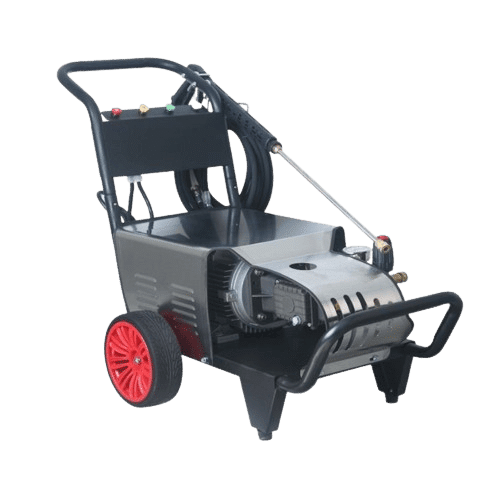
Cordless Pressure Washers
Cordless pressure washers, much like their gasoline and diesel counterparts, deliver power and efficiency in a compact package. They are designed for mobility, ready to tackle rigorous cleaning tasks at a moment’s notice. Yet, what sets them apart is their whisper-quiet operation and lightweight design. Free from cords and fuel dependencies, these models offer an unmatched blend of user-friendliness and convenience, making them a top choice for those seeking a hassle-free cleaning solution.
Hot or Cold Water Cleaning?
Another key factor to consider when choosing a pressure washer is whether your cleaning tasks require hot or cold water.
Choose between hot and cold water pressure washers for the best cleaning results by considering your specific cleaning requirements, budget and long-term cost-effectiveness.
cold water cleaning:
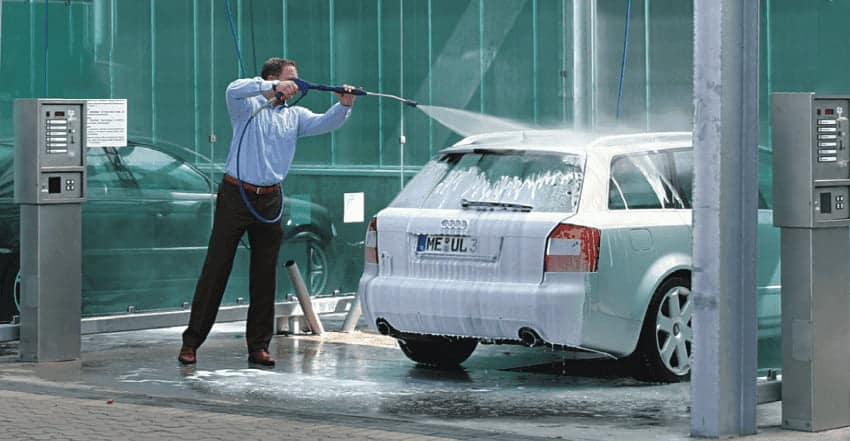
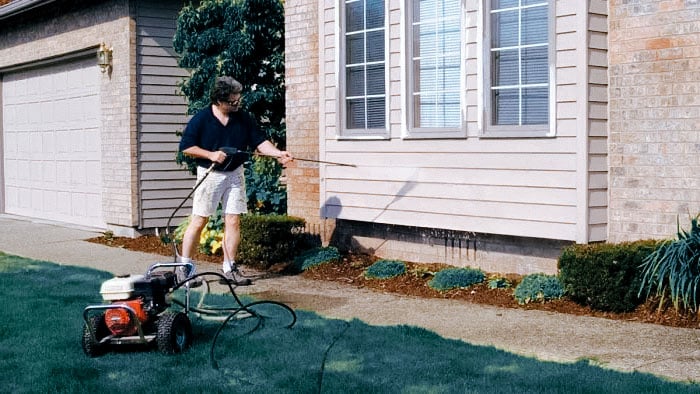
Cold water pressure washers are the most common type of pressure washer and are great for removing dirt, dust, mud and loose paint. They are generally cheaper and easier to maintain than water heaters.
Cold water pressure washers are popular due to their lower upfront cost compared to hot water machines. They don’t require a burner or heating coil to produce hot water, which contributes to their affordability.
Additionally, chillers are generally more practical as they are smaller and easier to operate in most cases. They are generally cheaper and easier to maintain than hot water machines. They are lighter, more portable and suitable for residential use.
Cold water is effective at removing loose paint, thick dirt, and mold from surfaces. However, high-quality chemicals are required for effective cleaning when it comes to greasy and oily substances.
Hot Water Cleaning:
If you expect to regularly remove grease, grime and oil from surfaces, then investing in a hot water machine may be a better use of your budget.
Hot water pressure washers are designed to handle tougher cleaning jobs. Hot water not only helps clean surfaces but also disinfects them, making these pressure washers ideal for areas where hygiene is critical.
While hot water machines cost more upfront compared to chillers, they are more cost-effective in the long run. Hot water cleaning eliminates the need for frequent purchases of chemicals or additional accessories for tougher cleaning tasks. Because the heat in hot water helps break down materials more efficiently, allowing for faster cleaning, cold water pressure washers typically just push materials onto the surface.
Hot water is particularly effective at breaking down grease and oil, exceeding the ability of chemicals alone. This makes hot water machines very popular as cleaning machines. They are widely used in industries that require thorough hygiene, allowing businesses in the hospitality industry to clean quickly and efficiently while complying with government regulations.
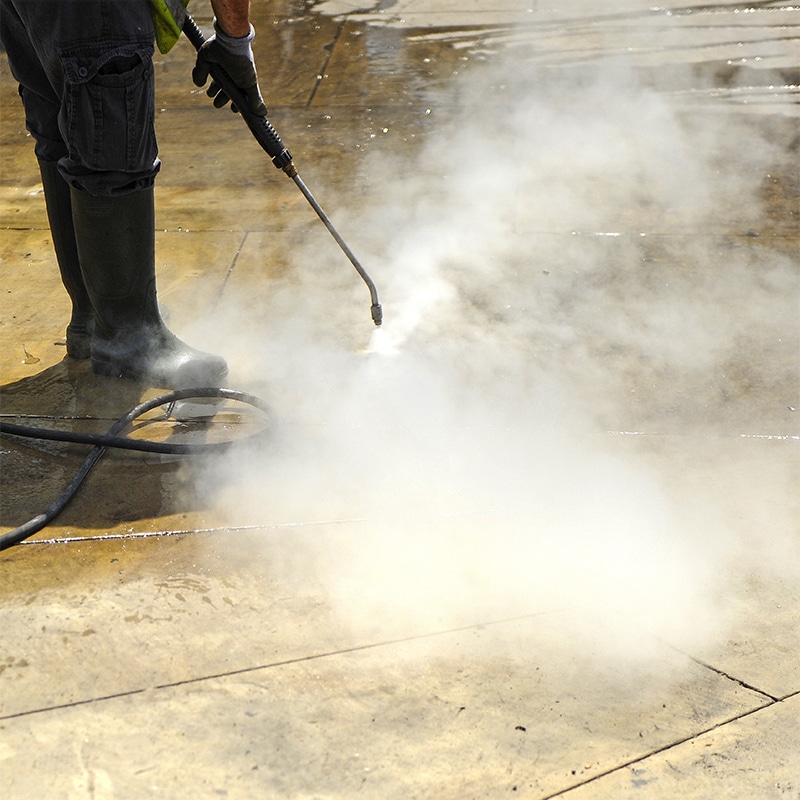
SPECIFICATIONS AND TERMS
When considering a pressure washer from a manufacturer’s perspective, it’s important to look at the specifications that define its performance. There are several terms that you’ll come across in relation to pressure washers, such as PSI, LPM, RPM, and industry categorization, all of which play a critical role in determining the right machine for your needs.
PSI: Pounds per Square Inch
PSI, or pounds per square inch, measures the pressure output of a pressure cleaner. It directly affects the cleaning performance of the machine. Insufficient pressure may require additional scrubbing, while excessive pressure can damage surfaces, including paintwork. The required PSI can vary depending on the cleaning task at hand. Here’s a rough guide to PSI ranges:
- 1,000 – 1,900 PSI: This low PSI range is suitable for average homeowners and can handle most household and vehicle cleaning tasks, from barbecues to car washes. It’s commonly found in domestic pressure cleaners.
- 2,000 – 2,900 PSI: This moderate-strength PSI range is ideal for heavier residential tasks or commercial cleaning purposes.
- 3,000 PSI: Considered high PSI, this range is commonly found in industrial and commercial machines. Caution is advised when cleaning surfaces at this pressure, with typical applications including industrial equipment, concrete, and boats.
- 3,000+ PSI: This PSI range is very high and requires extreme care as it can strip paint or damage surfaces easily. It is often used for tasks such as graffiti or paint stripping, as well as removing dried concrete from scaffolding.
Regardless of the chosen PSI range, caution should always be exercised when working with delicate surfaces. Even a low PSI machine can remove paint if used on rusty surfaces or with a pinpoint nozzle.
LPM: Litres per Minute/GPM: Gallons Per Minute
LPM, or liters per minute, measures the water flow rate of your pressure cleaner. Contrary to common belief, LPM (or flow) has a greater impact on cleaning performance than PSI. While a high PSI helps loosen dirt, it is the high flow rate that effectively removes it. Think of it like putting out a fire – you need a significant amount of water to extinguish it, and the same principle applies to pressure cleaning. The higher the flow rate, the faster it washes away dirt and grime.
RPM: Revolutions per Minute
RPM refers to the speed at which the motor of the pressure washer operates. Higher RPMs (3400+) are commonly associated with domestic machines that are not designed for prolonged use. These machines have shorter lifespans as the motor works harder during operation. Midrange RPMs (2800) are typically found in commercial machines designed for longer operating periods, though not continuous use. Low RPM machines (1450) are used for industrial applications and can run for 8+ hours per day. They are built to withstand continuous heavy use.
Industry Categorization
The industry categorization of a pressure cleaner is typically determined by the expected daily operating hours and the PSI/flow requirements. As a simple categorization guide, you can consider the following:
Domestic: Designed for limited use, typically 1-2 hours per day. Commercial: Suitable for up to four hours of daily use. Industrial: Built for heavy use, running 4-8+ hours per day.
Understanding these specifications and terms helps you make an informed decision when selecting a pressure washer that meets your specific cleaning needs.
How To Choose The Perfect Pressure Washer FAQs
It is typically recommended to use a pressure washer with at least 2000-3000 PSI when cleaning tough surfaces like concrete or brick.
To wash most surfaces, a PSI pressure of about 1000-3000 should be ideal for home use.
The main difference is that power washing uses highly pressurized steam to do the cleaning while pressure washing just uses unheated tap water, without the help of a heating element.
CONTACT US TO KNOW MORE BISON PRESSURE WASHER
